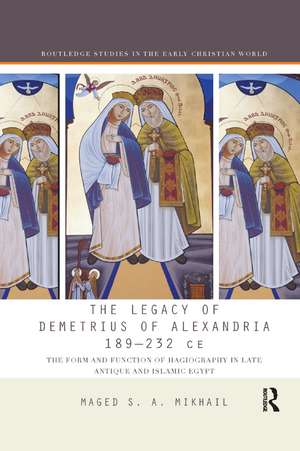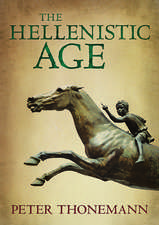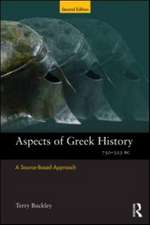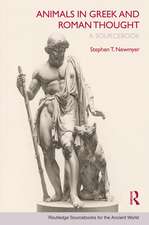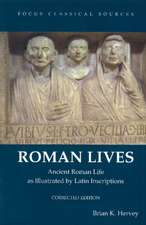The Legacy of Demetrius of Alexandria 189-232 CE: The Form and Function of Hagiography in Late Antique and Islamic Egypt: Routledge Studies in the Early Christian World
Autor Maged Mikhailen Limba Engleză Paperback – 12 dec 2019
This volume constitutes a definitive study of Demetrius, but more broadly, it provides a clearly delineated hagiographic program and charts its evolution against a backdrop of political developments and intercommunal interactions. This fascinating study is a useful resource for students of Demetrius and the Church in Egypt in this period, but also for anyone working on Early Christianity and hagiography more generally.
| Toate formatele și edițiile | Preț | Express |
|---|---|---|
| Paperback (1) | 384.31 lei 43-57 zile | |
| Taylor & Francis – 12 dec 2019 | 384.31 lei 43-57 zile | |
| Hardback (1) | 1109.99 lei 43-57 zile | |
| Taylor & Francis – 13 dec 2016 | 1109.99 lei 43-57 zile |
Din seria Routledge Studies in the Early Christian World
-
 Preț: 279.03 lei
Preț: 279.03 lei -
 Preț: 310.51 lei
Preț: 310.51 lei -
 Preț: 311.07 lei
Preț: 311.07 lei -
 Preț: 312.97 lei
Preț: 312.97 lei -
 Preț: 389.38 lei
Preț: 389.38 lei -
 Preț: 416.22 lei
Preț: 416.22 lei -
 Preț: 385.84 lei
Preț: 385.84 lei -
 Preț: 382.18 lei
Preț: 382.18 lei - 21%
 Preț: 258.15 lei
Preț: 258.15 lei -
 Preț: 382.18 lei
Preț: 382.18 lei -
 Preț: 395.47 lei
Preț: 395.47 lei -
 Preț: 380.45 lei
Preț: 380.45 lei -
 Preț: 381.81 lei
Preț: 381.81 lei - 16%
 Preț: 261.73 lei
Preț: 261.73 lei - 29%
 Preț: 787.71 lei
Preț: 787.71 lei -
 Preț: 387.96 lei
Preț: 387.96 lei -
 Preț: 391.79 lei
Preț: 391.79 lei
Preț: 384.31 lei
Nou
Puncte Express: 576
Preț estimativ în valută:
73.56€ • 79.93$ • 61.83£
73.56€ • 79.93$ • 61.83£
Carte tipărită la comandă
Livrare economică 21 aprilie-05 mai
Preluare comenzi: 021 569.72.76
Specificații
ISBN-13: 9780367876821
ISBN-10: 0367876825
Pagini: 228
Dimensiuni: 156 x 234 x 12 mm
Greutate: 0.33 kg
Ediția:1
Editura: Taylor & Francis
Colecția Routledge
Seria Routledge Studies in the Early Christian World
Locul publicării:Oxford, United Kingdom
ISBN-10: 0367876825
Pagini: 228
Dimensiuni: 156 x 234 x 12 mm
Greutate: 0.33 kg
Ediția:1
Editura: Taylor & Francis
Colecția Routledge
Seria Routledge Studies in the Early Christian World
Locul publicării:Oxford, United Kingdom
Cuprins
Preface
Abbreviations
Part I: The Genesis and Evolution of a Hagiographic Program
1. The Bishop and the Scholar
2. Sources
3. Early Imprints
4. Date and Socio-Literary Setting of the Sahidic Coptic Tradition
5. The Encomium on Demetrius as Hagiography
6. Hagiography across Language and Culture
7. Arabic Recensions, Amendments, and Omissions: Emergence of the Normative Hagiography
8. Lent and Epact in Alexandria
9. Form, Function, and Meaning
Part II: Texts – Demetrius’s Bio-Hagiographic Dossier
I. Earliest Evidence
II. An Encomium on Demetrius of Alexandria
III. Demetrius’s sirah in the History of the Patriarchs’ Primitive Recension
IV. Eutychius’s Nazm al-jawhar (The String of Pearls)
V. Kitab al-tawarīkh and the Chronicon orientale
VI. The Coptic-Arabic synaksar (Synaxarium)
VII. Abu al-Barakat’s Musbah al-zulma (A Lamp in the Darkness)
VIII. The Difnar (Antiphonarium)
IX. Doxologies and Praises
Works Cited
Index
Abbreviations
Part I: The Genesis and Evolution of a Hagiographic Program
1. The Bishop and the Scholar
2. Sources
3. Early Imprints
4. Date and Socio-Literary Setting of the Sahidic Coptic Tradition
5. The Encomium on Demetrius as Hagiography
6. Hagiography across Language and Culture
7. Arabic Recensions, Amendments, and Omissions: Emergence of the Normative Hagiography
8. Lent and Epact in Alexandria
9. Form, Function, and Meaning
Part II: Texts – Demetrius’s Bio-Hagiographic Dossier
I. Earliest Evidence
II. An Encomium on Demetrius of Alexandria
III. Demetrius’s sirah in the History of the Patriarchs’ Primitive Recension
IV. Eutychius’s Nazm al-jawhar (The String of Pearls)
V. Kitab al-tawarīkh and the Chronicon orientale
VI. The Coptic-Arabic synaksar (Synaxarium)
VII. Abu al-Barakat’s Musbah al-zulma (A Lamp in the Darkness)
VIII. The Difnar (Antiphonarium)
IX. Doxologies and Praises
Works Cited
Index
Recenzii
"The Legacy of Demetrius is a multi-faceted jewel of historical investigation. Mikhail first gathers together and contextualizes virtually all that we know of Demetrius himself, and then draws out for us the process through which Demetrius the legend evolved. Through this complex investigation new windows are also opened onto the distinctive shape of Christianity in late antique and Islamic Egypt. Rarely does a study so well combine these different style of exploration."
- Lewis Ayres, Durham University, UK
"Due to [his] innovative approach and a sovereign handling of the sources, Mikhail's book is considered very successful. His deconstruction of hagiographic legends and motifs, coupled with his analysis of various editorial levels, would have to set a new standard for the study of hagiographic texts."
- Daniel Vaucher, Universität Bern, Germany, Bryn Mawr Classical Review 2017
(See response from author to this).
See the author’s response to the reviews in separate document. I am happy with his responses, and I feel that the comments from Reviewer 1 on the need for the translations are unwarranted.
"Due to [his] innovative approach and a sovereign handling of the sources, Mikhail's book is considered very successful. His deconstruction of hagiographic legends and motifs, coupled with his analysis of various editorial levels, would have to set a new standard for the study of hagiographic texts."
- Daniel Vaucher, Universität Bern, Germany, Bryn Mawr Classical Review 2017
- Phil Booth, University of Oxford
(See response from author to this).
- Prof Lewis Ayres, Durham University, UK
- James Corke-Webster, University of Durham, UK
See the author’s response to the reviews in separate document. I am happy with his responses, and I feel that the comments from Reviewer 1 on the need for the translations are unwarranted.
Descriere
This is the first full-length study of Demetrius of Alexandria (189–232 CE), who generated a neglected, yet remarkable hagiographic program that secured him a positive legacy throughout the Middle Ages and the modern era. Drawing upon Patristic, Coptic, and Arabic sources spanning a millennium, the analysis contextualizes the Demetrian cor
